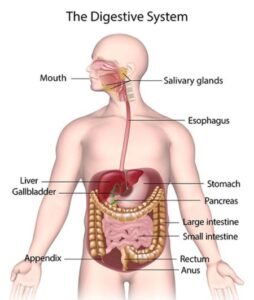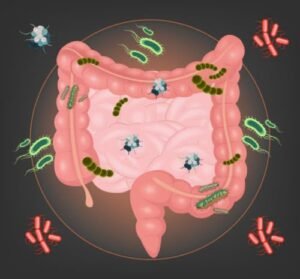The gastrointestinal tract, also referred to as the digestive system, constitutes a complex assembly of organs collaborating harmoniously to process food, assimilate essential nutrients, and expel waste materials from the organism. This complex system, including the mouth, throat, stomach, intestines, and organs like the liver and pancreas, is essential for breaking down food into nutrients needed by the body for energy, growth, and repair. This complex digestive process involves coordinated actions among various organs to move food through the digestive system, break it down into smaller parts, absorb essential nutrients, and remove waste efficiently.
Digestive system labelled
The intricate digestive network comprises a variety of organs collaborating to decompose food, absorb essential nutrients, and expel waste from the body. Below is a comprehensive overview of each organ’s role in this process:

- Mouth: Digestion initiates in the mouth, where teeth fragment food into smaller pieces, and saliva, secreted by glands, moistens and commences the breakdown of carbohydrates.
- Esophagus: This tube transports food from the mouth to the stomach via peristalsis, a series of muscular contractions facilitating food movement.
- Stomach: Utilizing gastric acids, the stomach decomposes food to aid in digestion and mineral absorption, primarily focusing on protein digestion with enzymes like pepsins and hydrochloric acid.
- Small Intestine: Acting as the primary site for chemical digestion, the small intestine, approximately 5 meters in length, digests proteins, fats, and carbohydrates. It boasts a significant surface area for nutrient absorption, including proteins, fatty acids, sugars, vitamins, and minerals.
- Large Intestine: Responsible for water, mineral, and vitamin absorption from residual food particles, the large intestine also converts waste into feces, absorbs water, and forms solid bowel movements before elimination through the anus.
- Liver: As the body’s largest gland, the liver performs various functions in digestion. It produces bile for fat digestion, metabolizes proteins, detoxifies the blood, stores iron, and generates plasma proteins.
- Pancreas: The pancreas secretes pancreatic juice containing enzymes and sodium bicarbonate into the small intestine. These enzymes aid in sugar, protein, and fat digestion, while sodium bicarbonate neutralizes stomach acid, optimizing enzyme activity.
- Gallbladder: Responsible for storing and concentrating bile produced by the liver, the gallbladder releases bile into the small intestine to facilitate fat digestion and absorption.
These organs collaborate seamlessly to ensure efficient food breakdown, nutrient absorption, and waste elimination, promoting overall health and wellness.
Must Read: UPPER RESPIRATORY TRACT INFECTIONS: A COMPREHENSIVE GUIDE
Gastrointestinal (GI) tract infections
Infections affecting the digestive system can arise from a variety of microorganisms, including bacteria, viruses, and parasites. These infections typically manifest with symptoms such as diarrhea, abdominal cramps, nausea, vomiting, and fever.
Bacteria like E. coli, Salmonella, and Campylobacter, along with parasites such as Giardia and Cryptosporidium, are frequently implicated in causing GI tract infections.
Based on the findings, gastrointestinal (GI) tract infections primarily fall into three categories:

- Bacterial Infections: These infections encompass foodborne illnesses and food poisoning.
Frequent bacterial offenders consist of Salmonella, Escherichia coli (E. coli), Clostridium perfringens, Listeria, and Staphylococcus. Consumption of contaminated food such as undercooked meat, eggs, or poultry, unpasteurized dairy, contaminated water, deli meats, and unwashed fruits and vegetables can lead to bacterial infections. - Viral Infections: Often termed as the stomach flu, viral gastrointestinal infections are prevalent, with Norovirus being a notable example. While other viruses causing such infections are less frequent in the United States compared to norovirus, they can still pose health risks.
- Parasitic Infections: Intestinal helminths (worms) and protozoan parasites are responsible for parasitic gastrointestinal infections, with giardiasis and cryptosporidiosis being the most common. Transmission can occur through contact with human feces in soil, contaminated water, or via transmission from animals to humans.
These infections typically manifest with symptoms like diarrhea, nausea, vomiting, stomach cramps, fever, muscle aches, gas, and bloating. While many cases of gastrointestinal infections resolve without medical intervention, severe instances may necessitate healthcare provider assistance.
Common causes
Gastrointestinal infections stem from a variety of sources, including viruses, bacteria, and parasites. Norovirus and Rotavirus are prevalent viral infections known to induce symptoms such as nausea, vomiting, and diarrhea. Bacterial infections often result from pathogens like Salmonella, Escherichia coli (E. coli), Clostridium perfringens, and Listeria, commonly found in contaminated food. Parasitic infections such as giardiasis and cryptosporidiosis can spread through contact with human feces in soil or tainted water sources. These microorganisms can trigger symptoms like diarrhea, vomiting, stomach cramps, and fever. To prevent gastrointestinal infections, it’s crucial to adhere to proper hygiene practices, implement food safety measures, and steer clear of contact with potentially contaminated substances.
Symptoms
Gastrointestinal infections typically manifest with symptoms including diarrhea, nausea, vomiting, stomach cramps, decreased appetite, fever, muscle soreness, and an imbalance in electrolyte levels. Additionally, these infections may cause gas, bloating, unintended weight loss, and, in severe instances, the presence of blood or mucus in diarrhea. The onset of viral gastrointestinal infections is often sudden, with symptoms potentially subsiding within a few days, whereas bacterial infections might feature an elevated body temperature or bloody diarrhea. Parasitic infections might involve blood or mucus in diarrhea and may persist until receiving treatment. Seeking medical attention is crucial if you are experiencing severe abdominal discomfort, a high fever, prolonged diarrhea, black stools, frequent vomiting, or signs of dehydration such as extreme thirst and dizziness. Individuals at elevated risk, including pregnant women, those with weakened immune systems, older adults, infants, and young children, should promptly consult a healthcare professional if they suspect a gastrointestinal infection.
Risk factors
Factors contributing to the development of infections in the digestive system encompass a range of elements concerning personal hygiene, environmental circumstances, and lifestyle preferences. Various common risk factors gleaned from the literature include:
- Inadequate Sanitation: Insufficient sanitation practices are implicated in the proliferation of gastrointestinal infections, particularly prevalent in regions with limited access to clean water and appropriate sanitation amenities.
- Unsafe Water Sources: Utilizing contaminated water for consumption or daily activities heightens susceptibility to gastrointestinal infections caused by parasites and bacteria.
- Hygiene Practices: Poor hand hygiene, notably following soil contact, before meals, or post-toilet use, facilitates the transmission of intestinal parasites and bacteria associated with gastrointestinal infections.
- Socioeconomic Status: Economic disparity influences infection prevalence, with lower-income households facing heightened risks due to constraints in acquiring resources for maintaining hygiene and sanitation standards.
- Rural Residence: Living in rural locales correlates with increased vulnerability to intestinal parasite infections, potentially due to challenges in accessing clean water and sanitation infrastructure.
- Consumption of Contaminated Food/Water: Ingesting undercooked or raw animal products, as well as unpasteurized dairy items or tainted water, amplifies the risk of bacterial and parasitic gastrointestinal infections.
- Exposure to Zoonotic Parasites: Pet ownership elevates exposure to certain zoonotic parasites like Giardia lamblia and Dipylidium caninum, heightening the likelihood of parasitic gastrointestinal infections.
- Personal Hygiene Practices: Inadequate adherence to personal hygiene measures, including skipping handwashing before meals, neglecting fingernail trimming, and infrequent handwashing, contributes to the dissemination of intestinal parasites and bacteria responsible for gastrointestinal infections.
Strategies for Preventing Infections in the Digestive System
To minimize the risk of infections in the digestive system, it is imperative to observe proper hygiene practices and adhere to specific precautions. Here are several essential steps recommended by reputable sources:
Hand Hygiene: Consistently wash your hands with soap and water, particularly after using the restroom, before meals, and following contact with potentially contaminated surfaces.
Food Safety: Ensure thorough cooking of food, abstain from consuming raw or undercooked items, and exercise caution during food handling to prevent contamination.
Personal Hygiene: Uphold high standards of personal hygiene by avoiding close contact with individuals displaying symptoms of infection, washing hands prior to food handling, and refraining from sharing personal items or utensils while unwell.
Hydration: Maintaining adequate hydration levels is paramount to preventing dehydration, particularly during episodes of diarrhea or vomiting associated with GI infections.
Seeking Medical Attention: Promptly seek medical guidance if symptoms persist beyond a few days, particularly if you experience severe abdominal discomfort, a high fever, signs of dehydration, or persistent diarrhea.
By adhering to these preventive measures, individuals can effectively lower their susceptibility to GI infections stemming from bacteria, viruses, or parasites, thereby promoting optimal gastrointestinal well-being.
Medical Treatment
Treatment approaches for gastrointestinal (GI) tract infections vary depending on the type of infection. Here’s a summary based on the provided information:
Bacterial Infections: Antibiotics aren’t typically prescribed for uncomplicated cases of bacterial infections such as Salmonella or E. coli. However, specific antibiotics may be necessary for bacteria like Campylobacter, Shigella, and Vibrio cholerae.
Viral Infections: Viral infections, commonly known as the stomach flu, usually resolve on their own within a few days. Norovirus is a frequent viral cause of gastroenteritis.
Parasitic Infections: Parasitic infections like giardiasis and cryptosporidiosis may require prescription antiparasitic medication to eliminate the parasite. These infections are often contracted through contaminated food or water sources.
General Treatment: Supportive care is crucial for most cases of GI infections, involving rest, hydration, and a bland diet. Over-the-counter medications can help alleviate symptoms such as nausea and diarrhea. In severe instances, hospitalization for rehydration may be necessary.
In summary, treating GI tract infections typically involves a blend of supportive care, specific medications for parasitic infections, and occasionally antibiotics for bacterial infections. It’s essential to seek medical advice if symptoms persist or worsen, especially for individuals at higher risk of complications.
For more information and the latest research on GI Tract diseases, visit: www.mayoclinic.org
